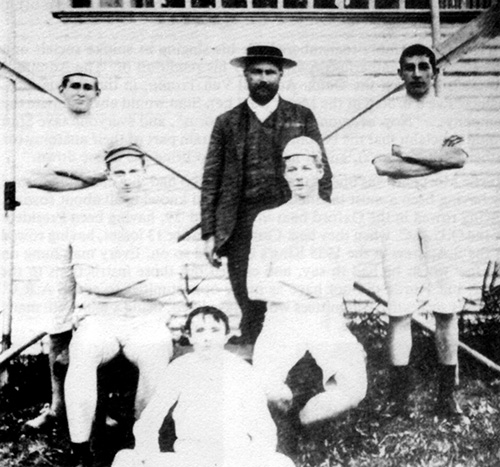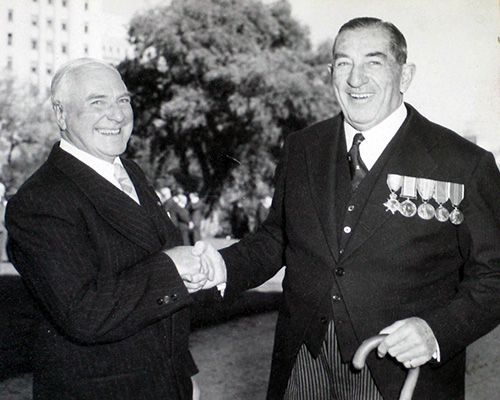Home >
Rowing Profiles > Cudmore, Collier R
Sir Collier R Cudmore
Adelaide Rowing Club (SA)
1908 - Olympic Games - Men's Coxless Four (UK) - Gold
Australian national Collier R Cudmore (later knighted) competed for England in the coxless four which won. He was competing in the Magdalen College crew
from Oxford University where he was studying. He therefore was Australia's most successful sweep rower at the Olympic Games until gold was again won
1992. Upon his return to Australia, he was a prominent member of the Adelaide Rowing Club.
Collier Cudmore was also the first Australian to row at the Olympic Games, even though he raced for
England in the Coxless Four in the London Games of 1908. Schooled at St Peter's College Adelaide, Collier Cudmore rowed in the school first Four.

Above: St. Peter's College Second 4, 1902.
L.A. Lewis, The Rev. H. Girdlestone, C. R. Cudmore, A. C. Magarey, S. Murray, A. G. Bagot, cox.
In the Adelaide Rowing Club history The First 100 Seasons by R W Richardson,
Richardson states that he gained much from his school coach Rev Henry Girdlestone, also his headmaster, who stroked the
Oxford crews of 1885 and 1886. From
Richardson's book -
After rowing in the St Peter's College first Four, he rowed twice for Adelaide University in the Oxford and Cambridge Cup before going on to Oxford and a rowing career which is probably the most famous of any Australian oarsman, with the exception of Steve Fairbairn. For two years the Magdalen College Four defeated all comers, winning forty consecutive events, including both the “Visitors” and the “Wyfold” in 1907, the “Stewards” in 1908 and finally the Olympic coxwainless Fours for Great Britain the same year.As 1908 was the first year rowing was included in the Olympics, [Authors - this is incorrect], Sir Collier was thus the first Australian oarsman to win a gold medal, and remained the only one until he died, except for our Scullers.
He rowed in the “Boat Race” and was 3 in the winning crew of 1909, when Oxford put up a time for the 4.25 miles which was not beaten for many years.
His coaches at Oxford were two famous men, Harcourt Gold and Guy Nickalls, and although his Parliamentary career did not allow him to do much coaching at Adelaide Rowing Club after his brief Adelaide rowing years ended, he was a sort of consultant coach to the Club coaches for many years. He joined Adelaide Rowing Club in 1913 and rowed in 1914 Champion 4's crew and was a committee man from 1920 onwards, and was prominent in the committee formed after the 1931 fire to handle the reconstruction of the boathouse and fleet.

Above: Adelaide Rowing Club Vice-Presidents Claude Coogan OBE (left) and Sir Collier Cudmore (right) celebrate the honours bestowed upon them in the Queens Birthday Honours list June 1958.
P A Howell in the Australian Dictionary of Biography records the life of Cudmore as follows:
Sir Collier Robert Cudmore (1885-1971), lawyer and politician, was born on 4 June 1885 at Avoca station, near Wentworth, New South Wales, second son of Daniel Henry Cudmore, pastoralist, and his second wife Martha Earle, nГ©e McCracken. Educated in Adelaide at the Collegiate School of St Peter and the University of Adelaide, and in England at Magdalen College, Oxford (B.A., 1909), Robert won a gold medal in rowing as a member of the British four at the 1908 Olympic Games. He was called to the Bar at the Inner Temple, London, in 1910, and, after returning home, to the South Australian Bar next year. Cudmore joined the Adelaide Club and the Liberal Union, serving as a branch secretary and as a member (from 1912) of that party's State executive. With (Sir) Stanley Murray, he established the firm Murray & Cudmore, in which he was to practise as a solicitor until 1955.
Commissioned in the Royal Field Artillery Special Reserve in France on 11 August 1915, Cudmore commanded a battery and was twice severely wounded; thereafter he wore a back-brace and used a walking-stick. His brother Milo was killed in action in 1916. Invalided home in 1919, Cudmore was a member of the State Repatriation Board, an administrator (1919-36) of the Soldiers' Fund, and deputy-chairman (1936-44) of the South Australian Sailors and Soldiers' Distress Fund. On 27 April 1922 in St Peter's college chapel he married Phyllis Miriam Wigg (d.1964). He was a member (1926-43) of the Anglican diocesan synod, a governor (1932-57) of his old school, and patron of the Adelaide City and University boat clubs. A director of North British & Mercantile Insurance Co. Ltd, Esperance Land Co. Ltd, and Elder, Smith & Co. Ltd, in 1947-56 he organized Elder's takeovers of De Garis, Sons & Co. Ltd, Commonwealth Wool & Produce Co. Ltd, Nenco Ltd and Moreheads Ltd. As vice-president of the South Australian Liberal Federation, he promoted its fusion with the Country Party in 1932 to form the Liberal and Country League. He was its president in 1934-36.
In 1933 Cudmore had been elected to the Legislative Council as a member for Adelaide Central District No.2. An able speaker and committee-man, he led his party in the Upper House from 1939 until his retirement in 1959. He defended the council's role as a house of review, and insisted that L.C.L. councillors convene separately and refrain from attending party meetings with their colleagues in the Legislative Assembly. He has been seen as a reactionary because of his opposition in 1945-46 to (Sir) Thomas Playford's nationalization of the Adelaide Electric Supply Co. Ltd when he once called Playford a 'Bolshevik'. Cudmore's antagonism may have owed something to his professional and family links with Murray, the company's chairman. Yet, Cudmore also mistrusted any large increase in the public debt when resources were required for postwar reconstruction. He was later to praise Playford's action.
A liberal conservative, steeped in the writings of Aristotle, Burke, Brougham and Adam Smith, Cudmore sponsored bills of his own and hundreds of his amendments were passed. From 1933 he had campaigned for a parliamentary public accounts committee, more liberal lottery and gaming legislation, and later hours for hotel trading. These proposals were anathema to Playford, but they became law soon after Labor won office in 1965. While demanding stiffer penalties for those who sexually abused children, Cudmore was too radical for many of his contemporaries in expressing approval of a properly controlled 'red light' district. He secured pensions for Supreme Court judges, better traffic laws, compulsory tuberculosis examinations, protection of circus animals, more humane methods for slaughtering livestock, and the introduction of racing and trotting meetings on Anzac Day. Although critical of soldier-settler and organized marketing schemes, of state capitalism and H. V. Evatt's plans for the Federal parliament's aggrandizement, Cudmore also insisted that the 'rights' of private property should be 'necessarily circumscribed in the interests of others'.
As a council-member (1933-53) of the University of Adelaide, Cudmore obtained changes to allow the appointment of a salaried vice-chancellor, and one who was not already a member of the university; he also gained pensions for the staff. He championed John Henry Newman's ideas on university education and fought for adequate funding of the humanities, especially history, quoting the dictum of the American patriot Patrick Henry: 'I know of no way of judging the future but by the past'.
During World War II Cudmore had been a battalion commander in the Volunteer Defence Corps and chairman of the Australian War Service League which proposed conscription of 'Manpower, Womanpower, Wealth and all other Resources' to promote 'equality of sacrifice'. He was knighted in 1958. While he cherished relics of the 'gracious living' of the late nineteenth century, he was a spender, not an accumulator, of wealth. Sir Collier was confined to a wheelchair in his last years. Survived by his son and daughter, he died on 16 May 1971 in North Adelaide and was cremated.
Compiled by Andrew Guerin March 2018



